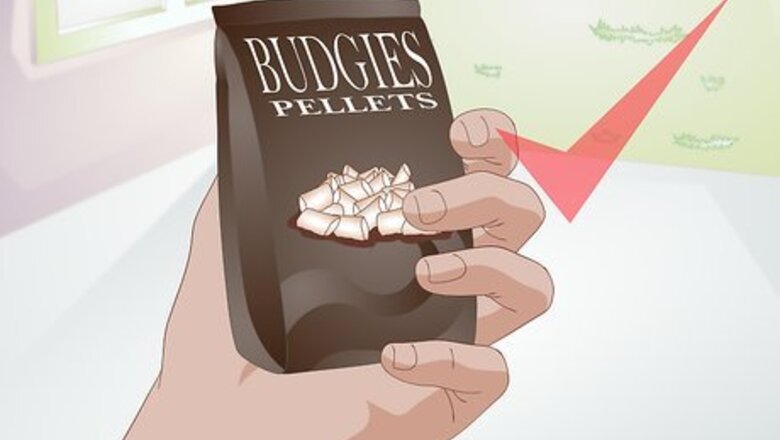
views
Choosing the Right Foods
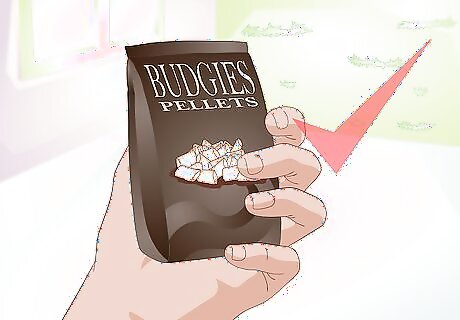
Buy pellets. One of the staples in a budgie's diet is pellets. You can buy pellets in your local pet food store that are suitable for budgies. The pellets are the best way for your budgie to have a nutritionally balanced diet because they contain tons of nutrients for the bird. When you buy the pellets, make sure they don't have any preservatives, added sugars, artificial colorings, or artificial flavors in them. Pellets are the best option for your budgie as they can't pick out the tastiest bits and leave the healthy bits behind.
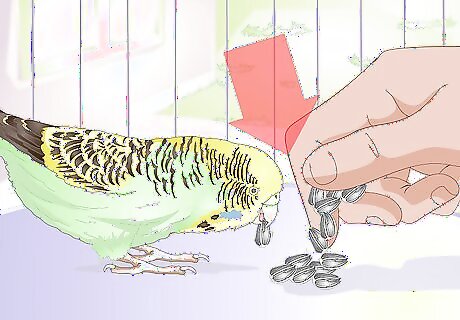
Try seeds. One good option to feed budgies is seeds. However, you shouldn't let your budgie fill up on seeds, as this can shorten a bird’s lifespan. This is because most seed mixes do not provide sufficient nutrients your bird needs and can cause cancer, obesity, and other health problems. Seeds should only make up 1/6 of your budgie's diet.
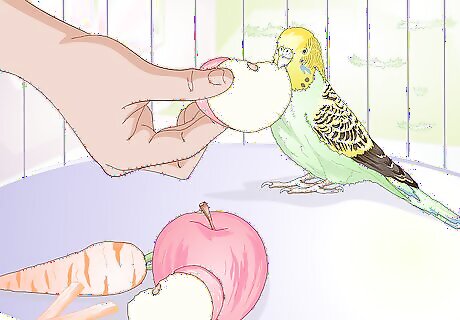
Use fruits and vegetables. Fruits and vegetables form a very important part of your budgie's diet. Dark green or yellow vegetables should be offered daily. Try fruits and vegetables such as apples, pumpkin, grapes, carrot, parsley, broccoli, mango, sweet potato, squash, and spinach. You can also serve millet 1 to 2 times a week. Feed the fruits and vegetables to your budgie raw, because cooking takes away vital nutrients. They can be served in any way the budgie prefers, which may be chopped, shredded, diced, sliced, pureed, or whole. Try multiple ways until you find the way your budgie likes best. Remove what your budgie doesn't eat after two hours, since cut, raw vegetables can go bad quickly. There are some fruits and vegetables that you should never feed your bird because they are toxic to him/her. This includes avocado, the pits and seeds of fruit (apple seeds contain cyanide and are especially toxic), chocolate, garlic, onion, mushrooms, uncooked beans, rhubarb, and the leaves and stems of tomatoes.
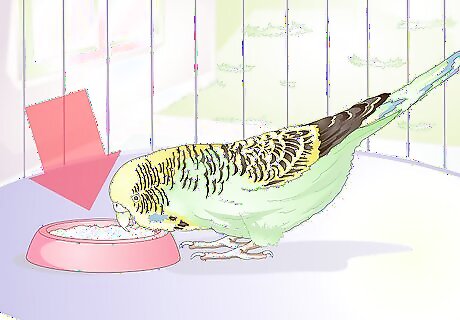
Feed your budgie grains. Many owners and breeders feed a mixture of soaked grains, which is called "soft food", as an extra treat in the bird's diet. You can add any grains you want, including quinoa, brown rice, cracked wheat, or barley. You can also add organic natural honey, fruits, or vegetables to the grains to make it more interesting. Pour the grains into a dish and soak them with water. After they have puffed up, drain the water and mix in whatever you want.
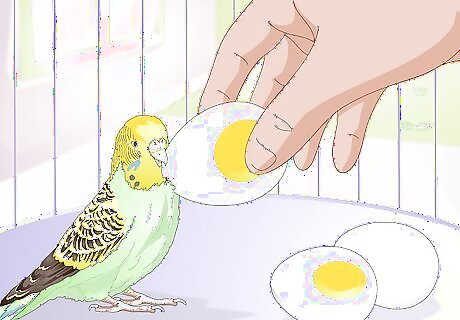
Provide hard-boiled eggs and grated cheese. Although this may sound unusual for a budgie, it adds a great source of protein for your budgie. It also adds a little variety to his diet and provides beneficial nutrients, which is always a good thing. Make sure you limit these special treats, however. You should never feed it this more than ½ tsp at a time.
Feeding Your Budgie Correctly
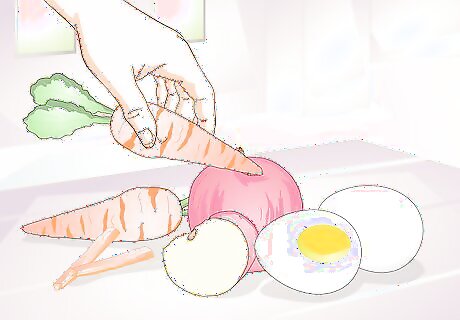
Keep it fresh and varied. Your budgie should have many different options to eat every day. As a general guideline, feed your budgie seeds and pellets every day. Fruits, vegetables, and soft foods should be fed to him every second day, or preferably every day. Egg should be feed to him once a week or once every other week. In addition to keeping the options fresh, you should also change the food every day, keeping fresh food in his dish. Always remove the old food before adding new food.
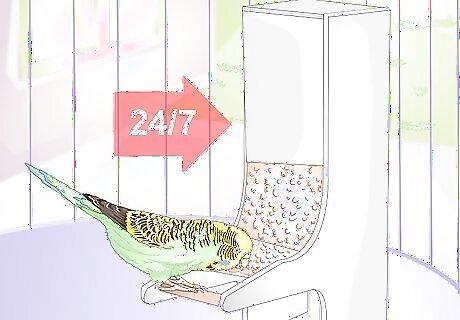
Use a suitable container. Your budgie needs to be able to access his food whenever he needs to. A budgie can get sick if he goes without eating for 24 hours, so he needs to be able to access his food at all times. The container shouldn't be too deep so the budgie doesn't have to dig too deep to get to the food. It should also be in a place near his water so he can eat and drink together.
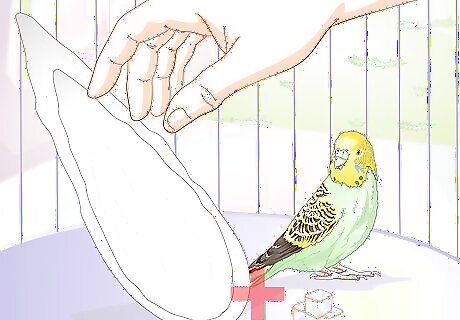
Provide a cuttlebone and a mineral block. Cuttlebones and mineral blocks are necessities for your budgie. They contain necessary minerals and nutrients that your bird might not be getting other places. The cuttlebone should be placed in the cage so the soft side faces the bird so he can scrape off the bone. If either becomes soiled with dropping, is eaten away or gets wet, throw them away and provide fresh ones. These also provide bird enrichment activities. Budgies like to perch on them and sometimes tear them apart. Let him do whatever he wants with them, as long as they stay clean and dry. He'll know when he needs to use them, so don't worry if he doesn't touch it for a while. His food may be providing him with enough nutrients for the time being.
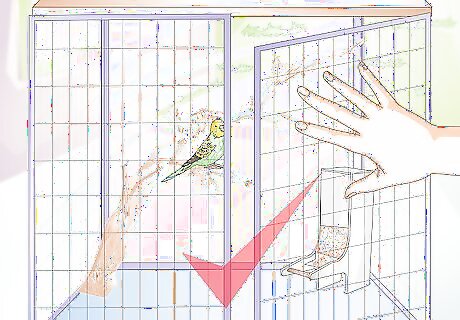
Prevent obesity. Your budgie needs ample cage space or room in your house to exercise. You should also pay attention to your bird's daily feeding habits to keep him from overeating. This can lead to obesity. An obese bird loses its streamlined appearance and can become lethargic and suffer health problems. An experienced avian veterinarian can help you determine if your budgie is overweight and help you decide how to help him if he is.
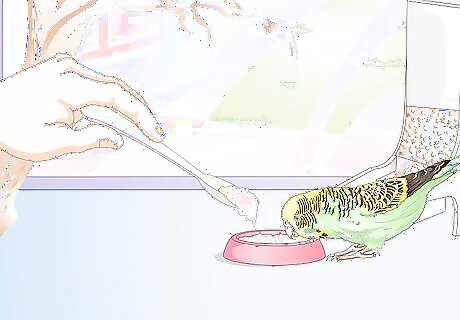
Balance the food. Budgies have very delicate systems. Any changes to his food should be done gradually over a long period of time. If you want to change his seed blends, add a little more of the new blend in each day and take away a little more of the old blend until he has completely transitioned to the new food. Your budgie's diet should be balanced over time, not all at once in one meal. Don't give him all of the different types of foods you feed him at once. Follow the general guidelines for feeding him and vary his food over time. Feeding him all at once can lead to overeating and make your bird unhappy or sick.
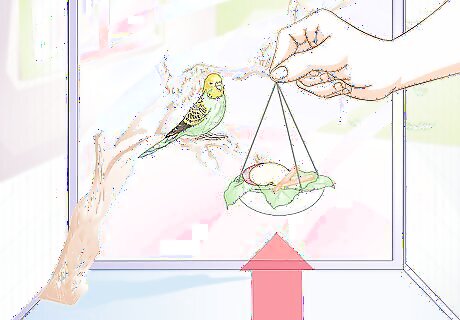
Get him to eat. Your budgie may not want to eat, which can be due to the presentation of foods or what you are feeding him. If he won't eat the fresh foods, chop up the veggies and fruits and put them in an empty feed cup. Hang the cup in his cage with a few leaves of leafy greens or another much-loved treat pegged above it. Do this every day until your budgie is finally won over and he is eating all his different kinds of foods.
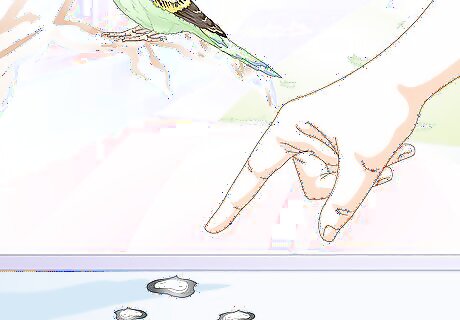
Watch for sickness. You should watch the consistency of your budgie's stool. This can indicate if he is getting too many fresh foods. If his stool becomes loose and watery, decrease the amount of fresh foods for a day or two. He may be getting too much liquid from them, which causes these kinds of problems. If the diarrhea persists, see your veterinarian to identify other causes.
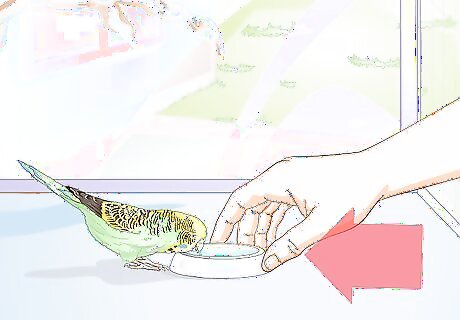
Change the water daily. All birds need water all day long in a clean water container. To keep clean and fresh, replace the water dish every day with a fresh dish. Clean the dish with vinegar and water only. Never use soap or chemicals to clean it. The vinegar will help prevent any bacteria from building up in the dish. Never put vitamins in the water because it could lead to infection or bacteria buildup, and your budgie may refuse to drink the water. The only things you should put in the water are medications, such as antibiotics, as instructed by your vet.











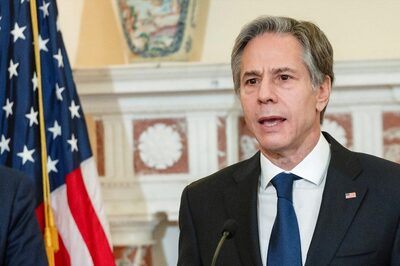


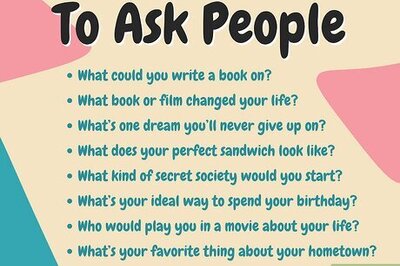

Comments
0 comment